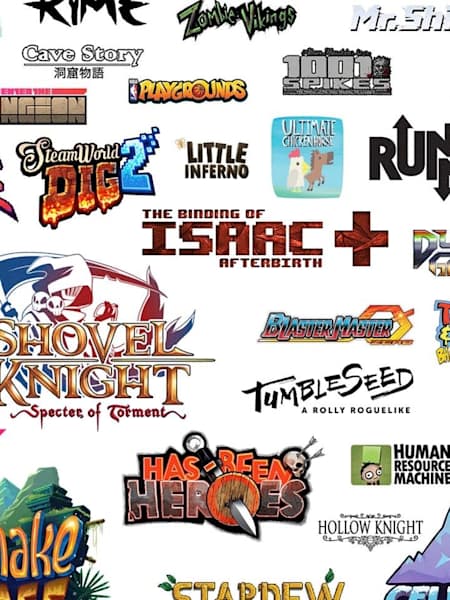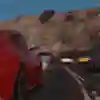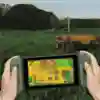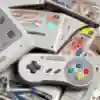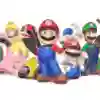Gaming
It's fair to say that the Switch has confounded the expectations of even the most optimistic Nintendo fan. Following on from the disastrous Wii U, Nintendo's groundbreaking hybrid system was perhaps underestimated by gamers and industry analysts alike, but it has sold briskly and some analysts are even predicting it could eventually eclipse the original Wii, which shifted over 100 million units during its lifespan.
Nintendo's own games have always traditionally been the system sellers, and that was certainly the case with the Wii – the console's biggest commercial successes were almost all first party games, a fact which left third-party publishers a little out in the cold. While Nintendo Switch releases like Super Mario Odyssey, Mario Kart 8 Deluxe and Splatoon 2 continue this tradition, the stunning rise of indie gaming has added a welcome wrinkle to the tale; small-scale studios are finding the Switch to be something of a dream ticket when it comes to getting their titles in front of as many people as possible.
For Shaun Roopra, The Dangerous Kitchen's artist, writer and games designer, Nintendo's success isn't hard to figure out. "It’s simply a good console with killer games, but it’s also new and interesting," he tells Red Bull Games. "We’ve all seen a box that plugs into the TV countless times so it’s great to see something different. I once played Zelda in bed by placing the Switch console vertically on a table and lay in bed sideways with a Joy-Con in each hand. It wasn’t the most comfortable way to play but the fact that I could even attempt this wacky manoeuvre – what other console gives you the opportunity to experiment?"
Image & Form's Brjann Sigurgeirsson is in agreement. "It's both handheld and stationary, and it supports both controller and touch input. The titles have been quite strong – you can't really say no to epic stuff like Breath of the Wild, Super Mario Odyssey and, of course, our own game, SteamWorld Dig 2! Also, the Switch is very tasty: it's easy to set up, sleek and clean yet versatile and modular. Unboxing a Switch is like getting a Barbie doll with all the right accessories, the house, the car AND Ken. It's really desirable, a real fashion statement. What is perhaps most remarkable is that it's the first of its kind, that it took someone until 2017 to develop a hybrid like this. But Nintendo have always been very innovative. The only company I could have imagined with a product like the Switch is Apple, but they’re completely invested in touch input and would've muddled their own waters by starting to offer controllers."
Andrew Newey, the developer of Golf Story – perhaps one of the Switch's biggest indie surprises this year – concurs; the ability to take the system on the road is a big selling point to many players, even those who don't play in portable mode all that much. "I think people like the idea of being able to take big games around with them. It seems really efficient to take your console game with you if you go somewhere. I feel like I'm getting extra value by getting a Switch game, even though I don't really use the handheld mode much."
Local co-op is the killer feature
A successful console is always attractive to developers, as a larger install base means a better opportunity to reach more players. However, in the case of the Switch, the console's unique setup has proven to be equally as tempting in attracting support. "In short and simple terms, portability and local two player are what attracted me to the Switch from a developer's perspective," says Fully Illustrated's Michael Heald, who released the old-school brawler Wulverblade on the console recently.
"There is no other console that can do this and when you create a game that is trying to replicate the experience of an old arcade game, nothing quite achieves this like the Switch. In fact nothing comes close."
Manfred Trenz of German studio Shin'en Multimedia – which has a long tradition of working on Nintendo consoles that stretches all the way back to the Game Boy Advance – was equally hooked when he laid eyes on the console. "We first got attracted from a gamer's perspective when we were invited by Nintendo to see the Switch for the first time. We wanted to play it ourselves! The console and mobile combination was simply a perfect fit." Shin'en's Fast RMX – the latest in a long line of Wipeout-style racing titles – remains one of the most technically impressive eShop titles, despite being available close to the launch of the Switch.
The Dangerous Kitchen found the console to be equally well-suited. "It fit our game perfectly," says Shaun Roopra. "As soon as we saw the leaked ‘NX’ prototype image that showed what the Switch would eventually become, we were dumbfounded. De Mambo is a multiplayer game that uses one action button and a D-pad, so the fact that the Switch is multiplayer focused with its detachable controllers that have less inputs than a regular controller, we knew instantly that if this rumour was true, the Switch was going to be the perfect home for De Mambo."
For Image & Form, which was one of Nintendo's key indie supporters during the Wii U era, the Switch is something of a vindication; proof that its dedication to Nintendo’s way of doing things has paid off. "It was the promise of something new and successful from the world's most inventive platform owner," says Sigurgeirsson. "Which, if you want to be negative, also can be read as a desperate plea for something great after the less-than-stellar sales performance of the Wii U. Nintendo selling a lot of hardware units obviously translates into us selling a lot of games."
A warm welcome
It's not just the appealing hardware and large audience which is pulling in developers this time around, however. Nintendo – which, in the past, hasn't had the best reputation when it comes to embracing small-scale studios – has done its utmost to make developing and publishing titles on Switch as painless as possible.
“Nintendo has been very good at making sure we're happy to be on board with them," adds Sigurgeirsson. "And they're really personal – I feel I know a dozen people there that I'd call if I visited the towns where they live – I'm not sure they'd like that, but I'd try anyway! It's a certain privilege to be accepted and appreciated by Nintendo, who in a sense epitomize gaming."
Heald – whose title Wulverblade was, at one point, destined to be an Xbox One exclusive – is equally effusive in his praise of Nintendo. "The team at Nintendo are epic. We’ve had a direct contact – at least one – at all times from day one. That is priceless. We’ve not had that with any other platform. Once you have a one-to-one relationship with someone it makes life so much easier and so much more personal. When you’re speaking to someone random each time you don’t get that personal connection. Some of the Nintendo folks at PAX were that lovely they were even coming over to bring chocolate and drinks to keep us going whilst we manned our booth… they could see we were flagging!"
I know a dozen people at Nintendo I'd call if I visited the towns where they live – I'm not sure they'd like that, but I'd try anyway!
FDG Entertainment's Philipp Döschl – which ported the Zelda-like smartphone title Oceanhorn to Switch this year – shares this view, but feels that in the past indie developers have been blinded by Nintendo's history. "Since Nintendo have been there for years and due to their importance in the console space, many devs approach them with some sort of reverence. It felt a bit like dealing with the God of video games. Nowadays Nintendo are down-to-earth and the people we're in touch there are all great and game loving folks, very communicative, open and helpful. We know the Wii times and how it was back then. To put it short, everything has changed there, to the better."
Psyonix, developers of Rocket League, just released on Switch, testify to this new, more open Nintendo. As the studios’ vice-president Jeremy Dunham revealed to us, it was Nintendo who approached him about bringing the turbo charged sports game to Switch. When he demanded Nintendo allow cross-platform play with Xbox One and PC gamers – something that would have been unthinkable during the Wii era – Nintendo simply said yes.
“They told us ‘Sure, whatever you need’. The fact there was no hesitation, they told us yes immediately the very first time we asked, was a really good olive branch,” Dunham says. “It showed us they were serious about Rocket League and the platform, and that we should take them seriously.”
Another key attraction for developers is the fact that Switch – unlike some of Nintendo's past systems – is very easy to work with. "When we first got hold of the system we didn't really know what to expect, but the development kit and documentation are really good," says DotEmu's Arnaud De Sousa, which published Wonder Boy: The Dragon's Trap on several consoles – including Switch – earlier this year. "Because the GPU is based on Nvidia Maxwell technology – also common on PC – it was quite easy to get it running. It is a big improvement from the Wii U and 3DS, which sometimes used awkward hardware or tools."
Döschl is a little more cautious on this point, but does admit that the console is attractive because it supports so many off-the-shelf engines, like Unity and Unreal. "It totally depends on the tech used," he says.
“All major engines already support Switch, so there's a possibility for everybody to bring their games to Switch. From what I've heard and seen from fellow devs is that Unity can be a struggle, due to its massive overhead. But this is a known issue in the engine that applies for no matter which platform you target, even PS4 and Xbox One."
FDG is set to bring Game Atelier's Monster Boy to the console soon, and Döschl says the team is pleased with progress. "It wasn't too hard to port the game to Switch. If I remember correctly, it took a couple of weeks. Of course there are some optimisations that still have to be done, but Game Atelier's still developing the game. It's already running at a smooth 60fps in 1080p."
But the eShop could be better
Naturally, it doesn't matter how welcoming the platform holder is or how much you like the console from a personal standpoint – if your game flops, then all of that effort and goodwill counts for nothing. Thankfully, the developers we spoke to have positive stories to tell when it comes to sales figures on Switch. Sigurgeirsson says that Steamworld Dig 2 has sold "many times more" than versions available on rival consoles, and De Souza reveals that Wonder Boy has been downloaded more times on Nintendo's console than all the other versions combined. FDG's Döschl says this as well – Oceanhorn on Switch has comfortably eclipsed the sales of the PS4 and Xbox One versions.
The indie gold rush is in full swing it would seem, but Heald urges caution to any indies who think simply releasing a game on the console will automatically put a Ferrari on your driveway. "The Switch has a lot of great titles now so competition is tough," he says. "It’s a tough industry these days anyway, and even when you have a game that gets incredible reviews it’s still really hard to convert that into sales."
It's a logical stance – the more games there are on a system, the harder it is to get noticed, even if you've created something special – and Love echoes Heald's sentiments. "Generally De Mambo’s ticking along casually and although we’re not able to afford our dream of pizza for breakfast, lunch and dinner for the rest of our lives, we’re just so happy we’ve had this opportunity."
Love also feels that while Nintendo have done a lot to make the process of development and publishing easier, there's still room for improvement. "A few more systems in place for fair distribution of social media promotion would be great as it’s very difficult to get noticed when you don’t have an immense marketing budget," she says. "The eShop is pretty poor and will hopefully improve, which we’ve already seen with the on-sale section but there needs to be an easier way to search for genre and a less brutal burying of older games."
Heald agrees on the eShop point, stating that a new user interface for the digital storefront is long overdue, while Döschl thinks there's potential for Nintendo to take advantage of Steam's cluttered, outdated feel. "The most important thing right now is to update and expand the eShop so it's ready for all these great games. Think of categories, a managed store with recommendations, and so on. With the decline of Steam and the big issues it has right now, it seems there's a void that Nintendo could fill."
For Sigurgeirsson, making the eShop better is of prime importance. "We're always talking about how congested mobile and PC gaming is getting, but look at how good games are displayed on App Store or Steam: there's always a number of ‘featured’ sections, and you can be guided towards games that you probably like. I was talking to a Nintendo-centric journalist towards the end of September, and he noted that decent new games were already starting to fly under the radar. These were typically self-published efforts from smaller devs, to whom a lack of visibility can be devastating. Nintendo can ensure that people will always find their games easily, and indies rely on their good graces. Unless there's some prevalent behavioural mechanism that makes us buy additional titles whenever we visit the eShop to get a particular game – and I don't think there is – you can only lament the games that came out on the Switch the same day as Mario Odyssey."
It might also seem like a given that the developers we spoke to will see Switch in their future plans, but it's a question worth asking all the same, especially as the eShop becomes ever more crowded and it gets harder and harder to get your game noticed. Sigurgeirsson, Trenz and Döschl all confirm that they will be supporting Nintendo's console moving forward, while DotEmu's De Sousa explains that his company is keeping a close eye on things – and hints that the firm's collection of retro-focused titles on smartphones could make the leap at some point.
For The Dangerous Kitchen, the next Switch project has the potential to be even more exciting as the developer can focus fully on the unique attributes of the console. "De Mambo was built before the NX was a thing, which means we couldn’t take full advantage of all the Switch’s features," explains Love. "That’s definitely something we’d like to tackle for future games. The Switch does feature in our long-term future plans, but also in our short-term future plans since as soon as I finish writing this I’m going to go play Mario Odyssey."

